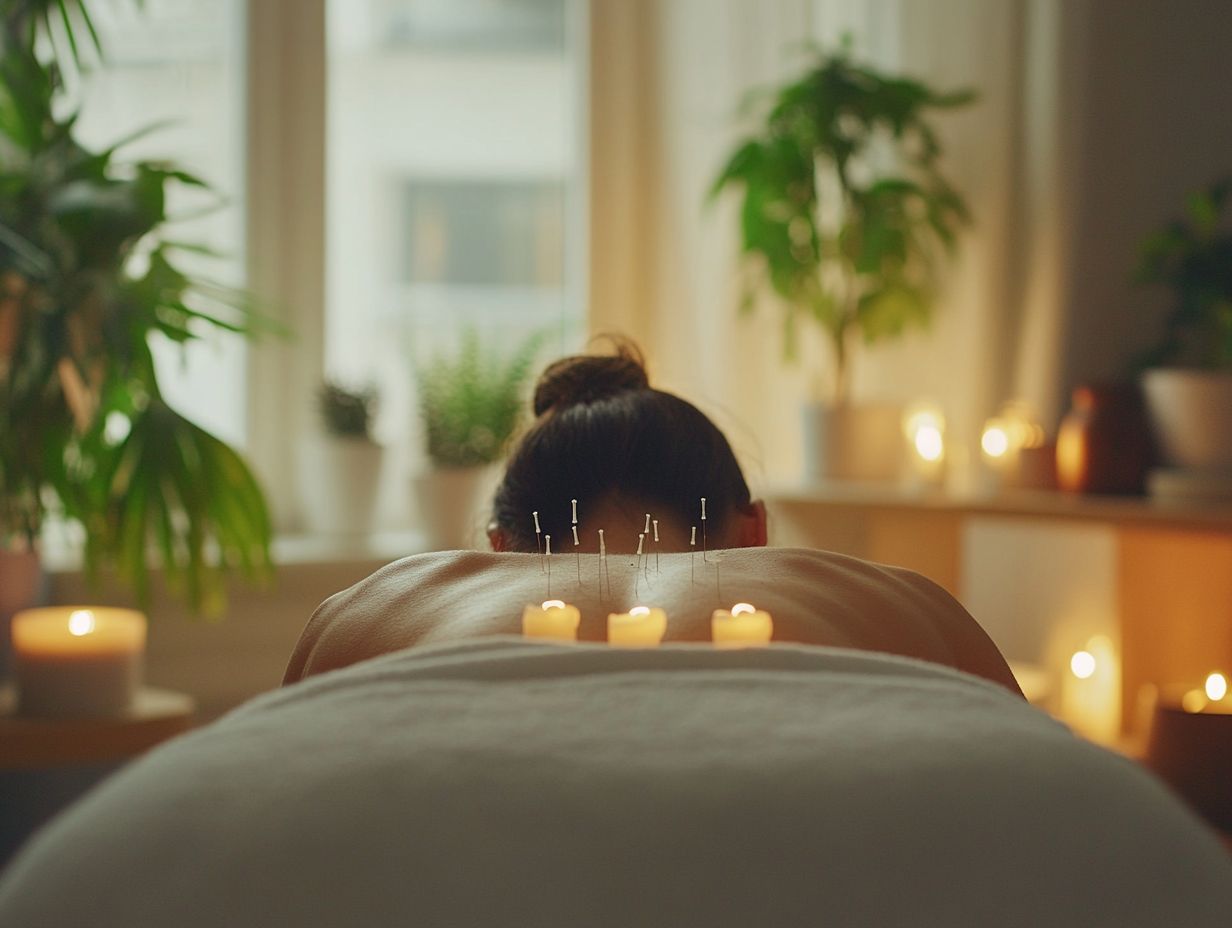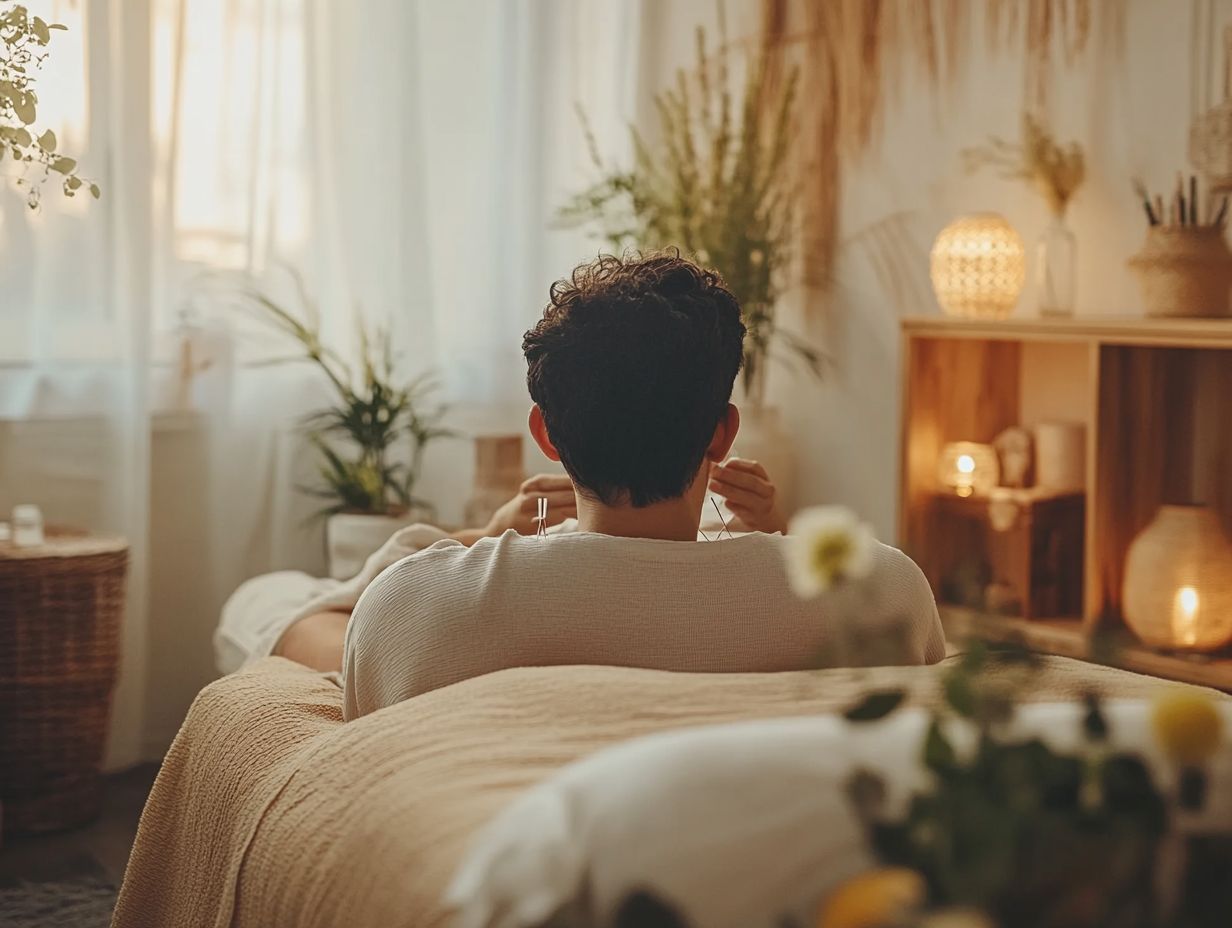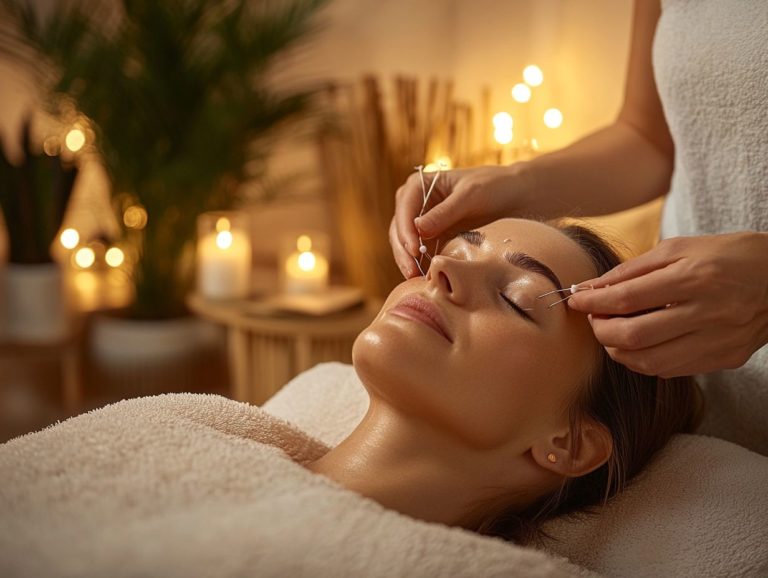5 Reasons to Try Acupuncture for Stress Management
In today s fast-paced world, stress can often seem like an uninvited guest that overstays its welcome, prompting you to seek effective methods to unwind and regain your balance.
Discover how this amazing therapy can help you unwind and relax! Acupuncture, an ancient practice deeply embedded in the principles of Traditional Chinese Medicine, presents a holistic approach to managing stress while enhancing your overall well-being.
This versatile therapy can promote relaxation, improve your sleep quality, alleviate headaches, and support your mental health. It offers a wealth of benefits tailored to your needs.
Dive into the advantages of acupuncture and uncover how it can elevate your stress management routine to new heights.
Contents
- Key Takeaways:
- 1. Promotes Relaxation and Reduces Stress
- 2. Helps with Insomnia and Improves Sleep Quality
- 3. Relieves Tension Headaches and Migraines
- 4. Supports Mental Health and Emotional Balance
- 5. Can Be Used as a Complementary Therapy
- What Is Acupuncture and How Does It Work?
- Frequently Asked Questions About Acupuncture
- What is acupuncture and how does it help with stress management?
- What are the 5 main reasons to try acupuncture for stress management?
- Is acupuncture safe for stress management?
- How many sessions of acupuncture are recommended for stress management?
- Are there any potential side effects of acupuncture for stress management?
- Can acupuncture be used in combination with other stress management techniques?
Key Takeaways:

- Feel the stress melt away with acupuncture your go-to solution for relaxation!
- Acupuncture helps relieve tension headaches and migraines, providing natural pain relief.
- Experience improved sleep quality, allowing for better rest and rejuvenation.
- Support your mental health with this natural and holistic approach.
1. Promotes Relaxation and Reduces Stress
Acupuncture stands as a remarkable practice that not only promotes relaxation but also significantly reduces stress, addressing both the physical and emotional dimensions of your well-being through holistic treatment methods.
By stimulating specific acupuncture points, it helps release endorphins and aids in hormone regulation. This effectively lowers cortisol levels, which can be elevated in those struggling with chronic stress.
This ancient technique, rooted in Traditional Chinese Medicine, offers you more than mere stress relief; it enhances the healing process and bolsters your overall mental health.
Research demonstrates that acupuncture can alleviate muscle tension, granting you greater physical ease and comfort. Many patients report experiencing a profound sense of emotional balance following treatment, as this practice is known to reduce anxiety and improve mood stability.
Testimonials from individuals highlight how regular sessions not only relieve tension headaches but also promote clarity and resilience in the face of daily challenges.
By integrating acupuncture into your self-care routines such as mindfulness and proper nutrition you can amplify its benefits, creating a synergistic effect that nurtures both your body and mind.
2. Helps with Insomnia and Improves Sleep Quality
Acupuncture has proven to be an effective ally in your battle against insomnia, enhancing sleep quality and offering a natural healing alternative for those struggling with sleep disorders.
This time-honored practice stimulates specific points on your body to improve the flow of energy, or ‘Qi’ (pronounced ‘chee’), which refers to the vital life force that flows through the body. It helps alleviate the underlying anxiety that often leads to restless nights.
Research, including studies published in the Journal of Clinical Psychiatry, reveals significant reductions in insomnia symptoms following regular acupuncture sessions, underscoring its potential as a holistic treatment.
To maximize these benefits, you might consider incorporating relaxation techniques such as deep breathing, mindfulness, or gentle yoga. These practices can beautifully complement acupuncture, further calming your mind and body and creating an ideal environment for restful sleep.
3. Relieves Tension Headaches and Migraines
Acupuncture is celebrated for its remarkable ability to alleviate tension headaches and migraines, offering a compelling pain management strategy rooted in alternative therapies. This holistic approach targets specific acupuncture points, such as Yin Tang situated between the eyebrows and Tai Chong, located on the foot.
These points are renowned for their calming and pain-relieving properties. By gently inserting thin needles into these areas, your body is prompted to release endorphins, which help reduce stress and enhance blood circulation.
Many patients have shared their encouraging experiences, often noting significant decreases in both the frequency and intensity of their headaches. Remarkably, lasting relief is frequently reported after just a few sessions.
Research studies further support this, indicating that acupuncture may be more effective than conventional medications, underscoring its potential as a safer, non-invasive option for those struggling with chronic pain.
Ready to take control of your stress and anxiety? Schedule an acupuncture appointment today for relief!
4. Supports Mental Health and Emotional Balance

Acupuncture serves as a powerful ally in supporting your mental health and emotional balance. By addressing mood disorders and providing effective anxiety treatment, it offers a whole-body approach that harmonizes both the mind and body.
This ancient practice stimulates specific points to enhance your energy flow while also regulating neurochemical activity, which refers to the chemicals in your brain that affect mood and emotions, cultivating a profound sense of inner calm. By balancing key neurotransmitters like serotonin and dopamine, acupuncture can significantly alleviate symptoms of depression and anxiety.
A skilled practitioner is essential in this journey, as they customize treatment plans to meet your unique needs, ensuring the best possible outcomes.
When you integrate acupuncture with other mental health strategies, you embrace a comprehensive approach that gives you the power to navigate stress with grace and build resilience. This synergy equips you to face life s challenges with renewed strength.
5. Can Be Used as a Complementary Therapy
Acupuncture serves as an exceptional complementary therapy within an integrative healthcare framework, elevating your wellness through natural healing methods.
By combining acupuncture with additional treatment options like biofeedback and relaxation techniques, you can effectively address not just the symptoms of chronic stress but also its root causes. For a more enriching session, consider following these tips for a successful acupuncture experience.
This holistic approach can enhance your overall quality of life, giving you the power to manage stress with greater efficacy. Many individuals who have embraced these therapies report substantial reductions in anxiety levels and a profound sense of calm.
One patient expressed that the blend of these methods helped her feel more centered and rejuvenated, while another remarked on how the synergistic effects improved her sleep and boosted her energy during the day.
What Is Acupuncture and How Does It Work?
Wondering how acupuncture works? Let s explore this fascinating therapy rooted in ancient wisdom. Acupuncture is a therapeutic practice deeply rooted in Traditional Chinese Medicine, where fine needles are expertly inserted into specific points on your body to restore energy flow and promote holistic health.
This ancient practice, with origins stretching back thousands of years, is founded on the belief that energy called ‘Qi’ (pronounced ‘chee’) flows through pathways within you.
When this energy gets unbalanced or blocked whether from stress, injury, or illness you may experience a range of health issues. By stimulating precise acupuncture points, practitioners work to unblock and rebalance the flow of Qi, supporting your body s natural healing processes.
Healthcare providers create personalized treatment plans based on your health and lifestyle. By educating you about the principles of acupuncture, they not only enhance your understanding but also give you the power to actively engage in your own health journey.
What Are the Different Types of Acupuncture?
There are several distinct types of acupuncture available, each offering unique treatment options tailored to your individual needs and preferences within a holistic wellness framework.
Traditional acupuncture is often celebrated for its comprehensive methodology, aiming to restore balance within your body’s energy pathways.
If you re seeking a more delicate touch, Japanese acupuncture might catch your interest; it uses finer needles and a gentler approach, making it an ideal choice for those with heightened sensitivity or specific chronic conditions.
Alternatively, auricular acupuncture zeroes in on stimulating points in the ear, demonstrating particular effectiveness in addressing addiction, anxiety, and pain management.
Your healthcare provider will consider your specific symptoms, medical history, and personal preferences to determine which style of acupuncture may yield the best results, ensuring a customized treatment plan that aligns seamlessly with your overall health goals.
What Are the Possible Side Effects of Acupuncture?

While acupuncture is generally safe, be aware of possible side effects, especially if the procedure isn’t performed by a certified practitioner using proper techniques.
You might encounter common side effects like minor bruising, soreness, or slight bleeding at the sites where the needles are inserted. Fortunately, these issues can often be minimized through correct techniques and by being well-informed about what to expect during and after a session.
Open communication with your acupuncturist is crucial. Discussing any concerns helps tailor the treatment to your specific needs and reduces discomfort. Choosing a qualified healthcare provider is essential for both effectiveness and safety during acupuncture.
An experienced practitioner will be better equipped to navigate potential complications and enhance your overall experience.
How Can Acupuncture Help with Specific Health Conditions?
Acupuncture can offer you relief for specific health conditions, serving as an effective treatment for anxiety and pain while promoting your overall emotional well-being.
This ancient practice has garnered recognition for its capacity to tackle a range of issues, including anxiety disorders, chronic pain, and insomnia.
Numerous studies underscore its efficacy. For example, research published in the Journal of Pain revealed that participants who underwent acupuncture experienced significant reductions in chronic pain symptoms compared to those receiving traditional care.
A meta-analysis in the journal Sleep Medicine found that individuals who received acupuncture enjoyed marked improvements in sleep quality and a reduction in insomnia symptoms.
These findings emphasize how acupuncture not only targets specific ailments but also embraces a holistic approach to enhancing both emotional and physical health.
What Should One Expect During an Acupuncture Session?
Experience a serene atmosphere during your session where a trained practitioner skillfully performs needle insertion at various specific locations on your body to enhance your overall wellness.
Before treatment, engage in an initial consultation. This is your moment to discuss your specific health concerns and goals. This discussion helps create a personalized treatment plan, allowing the practitioner to gain valuable insights into your lifestyle and emotional state.
Once the treatment begins, the practitioner will gently insert fine needles, prioritizing your comfort at every step. Throughout the session, maintaining open communication is crucial, allowing you to express any sensations or concerns that arise.
This collaborative approach fosters trust and enhances the effectiveness of the therapy, creating a holistic experience that nurtures both your physical and emotional health.
How Can One Incorporate Acupuncture into Their Stress Management Routine?
Incorporating acupuncture into your stress management routine can greatly enhance your relaxation techniques and promote overall well-being, as highlighted in 5 ways acupuncture can help with stress relief through a holistic approach.
By combining acupuncture with practices like mindfulness and yoga, you can create a balanced strategy to effectively tackle stress. For instance, scheduling your acupuncture sessions before or after your yoga classes can deepen the relaxation you experience during those physical activities. Plus, you might discover surprising benefits of acupuncture that enhance your overall well-being.
Taking time for mindfulness meditation after your acupuncture can improve your mental clarity and emotional stability. Establishing a consistent routine, such as scheduling acupuncture appointments weekly or bi-weekly, reinforces these benefits.
Over time, you may notice a reduction in anxiety levels, improved sleep quality, and an enhanced overall sense of well-being. This trio of practices can become a powerful tool in your personal wellness journey.
Don’t wait! Book your first session today and discover the benefits of acupuncture!
Frequently Asked Questions About Acupuncture

What is acupuncture and how does it help with stress management?
Acupuncture is a traditional Chinese medicine practice. It involves inserting thin needles into specific points on the body.
This practice can stimulate your body s natural healing response. It helps alleviate both physical and mental symptoms of stress.
What are the 5 main reasons to try acupuncture for stress management?
The top five reasons to try acupuncture are:
- It is a natural treatment that doesn t require surgery.
- It reduces stress levels and promotes relaxation.
- It improves sleep quality.
- It boosts energy levels.
- It addresses imbalances in the body that contribute to stress.
Is acupuncture safe for stress management?
Yes, acupuncture is generally safe and low-risk. Always seek treatment from a licensed and experienced acupuncturist to ensure proper techniques and safety measures are followed.
How many sessions of acupuncture are recommended for stress management?
The number of sessions varies based on individual needs. Some may feel relief after a few sessions, while others benefit from ongoing treatment.
Talk to your acupuncturist today to create a personalized treatment plan that works for you!
Are there any potential side effects of acupuncture for stress management?
Acupuncture is considered safe with few side effects. Some people may experience minor bruising or temporary discomfort at needle insertion sites.
These side effects are usually mild and resolve quickly.
Can acupuncture be used in combination with other stress management techniques?
Yes! You can combine acupuncture with exercise, meditation, and therapy. Acupuncture can enhance the effectiveness of these methods by promoting relaxation and reducing tension.
Start your journey to relaxation with acupuncture today!






